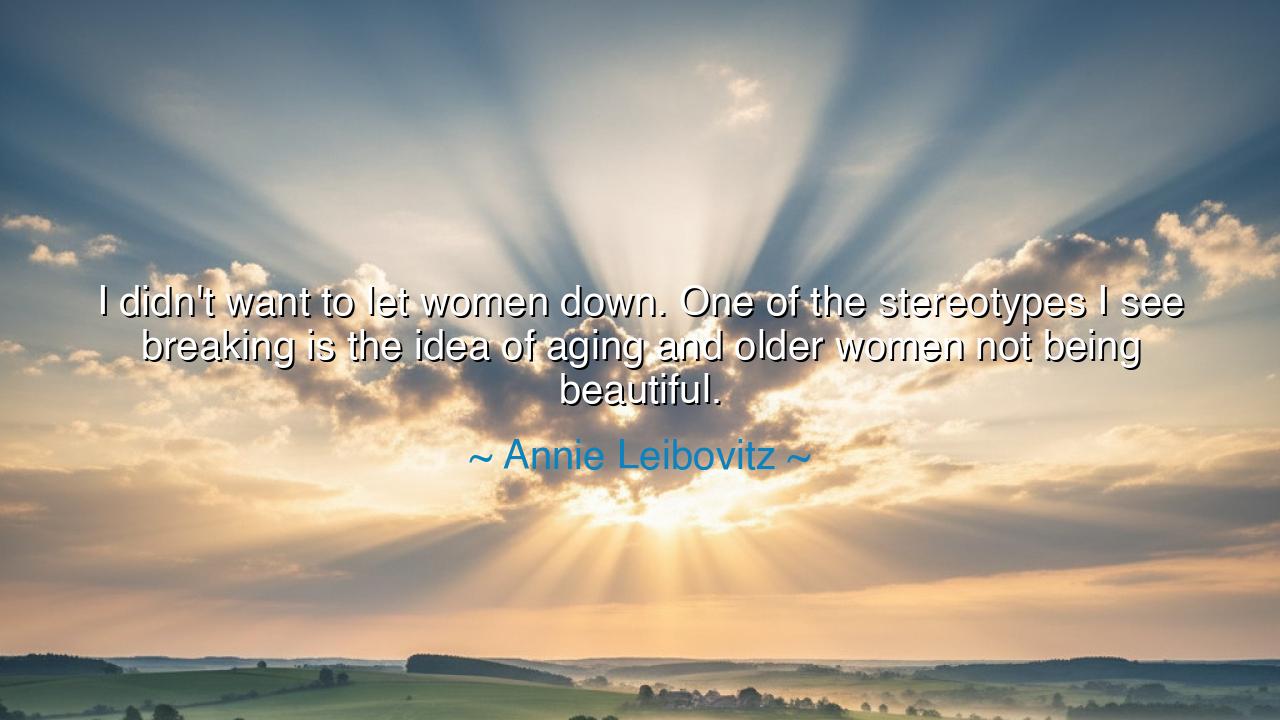
I didn't want to let women down. One of the stereotypes I see
I didn't want to let women down. One of the stereotypes I see breaking is the idea of aging and older women not being beautiful.






The words of Annie Leibovitz, master of the lens and chronicler of human beauty, are filled with both resolve and tenderness: “I didn’t want to let women down. One of the stereotypes I see breaking is the idea of aging and older women not being beautiful.” Here she speaks not only as an artist but as a guardian of truth. For too long, the world has bowed to false idols, worshiping youth alone and casting aside the wisdom of years. In this saying, Leibovitz calls us to behold beauty not as fleeting skin but as enduring spirit, carried with dignity into every season of life.
The ancients, too, revered the power of age. The matriarch was honored in tribes and kingdoms as the keeper of memory, the one whose face, though marked by time, shone with the majesty of experience. Where modern eyes sometimes see decline, the ancients saw strength. Leibovitz, through her art, revives this older wisdom: that women, in their age, carry a radiance untouched by fashion, a light born of survival, courage, and story.
Consider the life of Eleanor Roosevelt, once mocked for her plain looks, but later revered as a woman of unmatched grace and influence. In her later years, she was no less powerful, her very presence commanding respect and admiration across nations. Did her beauty fade? To the shallow eye, perhaps—but to the discerning heart, her beauty deepened, becoming a beacon of compassion and justice. She shattered the falsehood that only the young may shine, embodying the very truth Leibovitz speaks of.
The meaning of this quote is also a vow of loyalty. By saying she did not wish to “let women down,” Leibovitz acknowledges her role as more than a photographer. She is a storyteller, entrusted with shaping how the world sees womanhood. In her defiance of the stereotype, she honors not only the faces before her camera, but the dignity of women across generations. To uplift older women as beautiful is to restore what culture has stolen—the recognition of their worth.
Let the generations remember: true beauty is not bound to the freshness of spring, but lives also in the strength of autumn and the stillness of winter. To see this is to see with wise eyes, eyes unclouded by shallow measures. Leibovitz, like a prophet of the modern age, teaches us that every wrinkle tells a story, every gray hair is a crown, and that the glory of women does not fade with time, but only grows more luminous.






TNHuyen Trang Ng
Annie Leibovitz’s reflection on not letting women down by perpetuating ageist beauty standards is powerful. It’s a reminder of the importance of representation and the role that iconic figures can play in breaking down outdated views. However, can a single voice truly shift societal perception? How can we support and amplify the stories and faces of older women in media, fashion, and culture to ensure that this stereotype is fully dismantled?
NPPhan The Nguyen Phuoc
Leibovitz’s words resonate with the need to redefine beauty in a broader sense. Women shouldn’t feel pressured to conform to a narrow image of beauty that’s tied to youth. But in a world where youth culture dominates, how can we create more acceptance for the beauty of older women? Are we truly ready to embrace the idea that beauty doesn’t diminish with age, or are we just beginning to scratch the surface of this shift?
MTnguyen thi minh tu
This quote makes me think about how deeply ingrained beauty standards are, especially for women as they age. Leibovitz seems to be highlighting a very personal mission to show that older women can be just as beautiful as younger women. Is this something we should all take responsibility for in how we view aging? Could it be that challenging these stereotypes is not just about beauty, but about recognizing a woman’s worth regardless of age?
VDLong Nhat Vo Duong
Annie Leibovitz’s quote challenges societal norms about aging and beauty, particularly for women. It’s refreshing to hear someone in the spotlight push against these stereotypes. But how much has the standard of beauty really shifted? While there are more representations of older women in media today, do we truly see them celebrated for their beauty, or is there still a tendency to focus on youth as the ideal? What can we do to further break down these barriers?